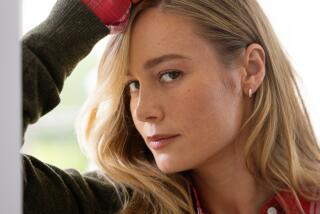A lesson in human nature
- Share via
College SUNRISE is the amusingly inapt name of the slightly shady finishing school dreamed up by Muriel Spark as the setting for her latest novel. Founded by a couple still in their 20s, Rowland Mahler and Nina Parker, as a way of ensuring themselves sufficient leisure and income to support Rowland’s literary aspirations, College Sunrise boasts a grand total of nine students. Among the offerings are creative writing, taught by Rowland, who at the moment is suffering from writer’s block, and Nina’s afternoon comme il faut sessions:
“When you finish at College Sunrise you should be really and truly finished,” she tells her charges. “Like the finish on a rare piece of furniture.
“Your jumped-up parents (may God preserve their bank accounts) will want to see something for their money. Listen: when you eat asparagus in England, as everyone knows, you take it in your fingers, but the secret of exquisite manners with regard to asparagus is to eat it held in your left hand. Got it?”
The school’s free-form ambience and undemanding curriculum please students and parents alike:
“I can’t tell you ... the difference in Leg after her two terms with you,” writes Pansy Leghorn’s delighted mother. “She used to be so stiff and goody-goody.... She actually wore golf socks over her stockings and oh my God those white blouses. But ... you have done wonders for Leg. She has painted the kitchen ceiling green ... she wears skintight jeans and skirts up to here ... she looks lovely now.... Mr. Mahler’s course in writing has really got Leg thinking. She took a bunch of newspaper clippings, jumbled them up, took the fifth word out of every printed line and made a fantastic poem. That’s freedom of expression, Mum, she said.”
For 17-year-old Chris Wiley, a year at College Sunrise provides the perfect opportunity to work on the book he is writing: a historical novel about Mary, Queen of Scots. To Rowland’s surprise, and dismay, Chris’ novel-in-progress has all the earmarks of a bestseller and has already attracted the attention of publishers and filmmakers. The prospect of his student’s literary success drives Rowland almost mad with envy, which Spark, invoking the teachings of her Roman Catholic faith, characterizes as a sin against the Holy Spirit. Jealousy, she points out, “is an affliction of the spirit which, unlike some sins of the flesh, gives no one any pleasure.”
Spark’s ingeniously comic treatment of jealousy certainly affords pleasure to the reader, however. While Rowland tries to undermine Chris’ endeavor, the fledgling author maintains a blithe insouciance based on a seemingly unshakable confidence in his own creative powers. He has youth, he has talent, he has an interesting theory about the murder of Mary’s husband, Darnley, and he’s already well along in the actual writing of the book. When a fellow student tells him she’s found Rowland snooping among his things, Chris laughs: “He wants my secrets. However, I like Rowland. I couldn’t manage without him in a way. He’s the yolk of my egg. The white part’s not enough. The yolk, for better or worse.”
But although Chris seems unperturbed by Rowland’s envy, Nina fears that her husband’s obsessive jealousy might lead to anything, even murder.
Spark has packed a multitude of twists and turns into this relatively brief novel, and the action skims along merrily from one surprising revelation to the next. The octogenarian author of 20-odd novels clearly enjoys poking fun at some of the more sacrosanct nostrums of creative writing: “Do you find ... that at a certain point your characters are taking over and living a life of their own?” Rowland asks Chris. “No,” Chris replies. “Your characters don’t live their own lives?” “No, they live the lives I give them.”
Chris’ no-nonsense attitude is refreshing, but there’s still an important truth in what Rowland has said, and the difference between the two ways of writing may shed light on the strengths and limitations of Spark’s own approach. Spark’s characters do exactly what she tells them to, and it is always she, and no one else, who has the last word. One doesn’t look to Spark for the flesh-and-blood, deep-as-life characters of a Tolstoy. Hers bear a closer resemblance to the stylized caricatures of early Evelyn Waugh. The characters in “The Finishing School,” like those in her recent -- and much less successful -- novel, “Reality and Dreams,” are paper thin: stick figures. But in this case, the liveliness of her satire and the exuberance of her inventions more than make up the difference. *
More to Read
Sign up for our Book Club newsletter
Get the latest news, events and more from the Los Angeles Times Book Club, and help us get L.A. reading and talking.
You may occasionally receive promotional content from the Los Angeles Times.







